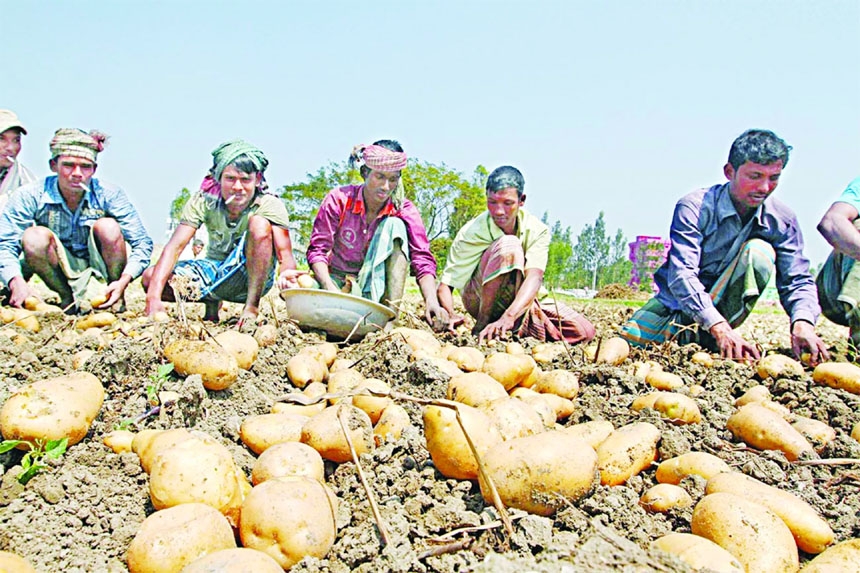
Business Desk :
Potato farmers have come together to inaugurate this year’s exports in a sign of the country’s continued success in selling potatoes abroad. Four potato producer cooperatives joined the inauguration in Pairabandh, Mithapukur – the third annual inauguration in a row.
Md Sayedul Islam, Secretary of the Ministry of Agriculture, and Benojir Alam, Director-General of the Department of Agricultural Extension (DAE), joined the function while private sector exporters and representatives from public agencies were present, said a FAO press release.
Farmers from Rangpur region have been producing export-quality potatoes by using ‘good agricultural practices’ (GAP), a collection of principles for safe and healthy farming and processing. The success of this initiative is due to a partnership between the Sara Bangla Krishak Society (SBKS), a national network of farmers’ organisations, and the Food and Agriculture Organization of the United Nations (FAO), under the ‘Missing Middle Initiative’ project. The project provided GAP training to 100 farmers from four cooperatives. More than half of the farmers were women. The farmers also received pre-production, inspection, and post-harvest assistance.
FAO organised a pre-season buyer-seller meeting for officials from the Bangladesh Potato Exporters’ Association (BPEA) to meet smallholder potato farmers. Officials from the BPEA liaised with foreign buyers to get specifications and orders. As a result, the potato producers have grown 450 metric tons of Santana potato, a high yielding Dutch commercial variety.
The producers were also able to procure seeds from the exporters at an affordable price. They also grew Diamant, Cardinal, Granola, and Asterix varieties which are in high demand in Malaysia, Nepal, Sri Lanka and countries in the Middle East and North Africa. The DAE and the Bangladesh Agricultural Development Corporation (BADC) have been supporting potato producers to increase export since 2019.
According to DAE, more than 480,000 hectares of land were under potato production this year. The yield will be more than 11 million metric tonnes (MT), but domestic demand for potato is only about 7.7 million tones.
Of the surplus potatoes, only a quarter can be stored for sale. Therefore, the loss of the farmers due to unsold surplus production and post-harvest losses is estimated at between BDT 25 to 35 billion (US$ 290 to 400 million). In order to prevent this significant loss, the government encourages potato exports. There are, however, challenges which include meeting export protocols of importing countries, lack of sufficient quantity of preferred varieties, lack of farmer awareness of export quality potato varieties, and finding ways to produce potatoes without quality issues such as hollow hearts, brown rot, or insects.
To address these challenges, the Ministry of Agriculture is sharing GAP with farmers throughout the country. The formulation of a Bangla GAP policy is almost complete. Work is also in progress to set up advanced laboratories to meet exporters’ sanitary and phyto-sanitary requirements.
FAO Representative in Bangladesh Robert D Simpson said, “In order to truly thrive, the potato export value chain requires a productive alliance among all involved – the government, private sector, and producer organisations. Bangladesh has a lot of potential to grow commercial and export varieties of potatoes and we are working closely with the Ministry of Agriculture to boost potato exports in order to strengthen food security and increase incomes for farmers and farming communities.”

